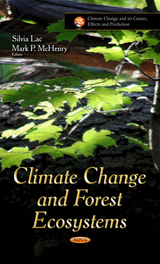External publications

Small-scale producers, risk and climate change in an Amazonian municipality
Rodriguez Osuna, Vaness / Jan Börner / Marcelo CunhaExternal Publications (2014)
in: Lac, Silvia / Mark McHenry (Eds.), Climate change and forest ecosystems, New York: Nova Science Publishers, 135-151
Macro-level assessments indicate a temperature increase and change in precipitation patterns as well as a higher incidence of climate extremes in the Amazon region. These include extended floods and droughts as well as a warmer and drier climate especially in the Eastern part of the biome causing substantial economic damage and hardship particularly for small-scale producers in the region. To properly integrate 60% of the Brazilian territory into the National Climate Change Plan improved knowledge about the vulnerability of rural inhabitants (80% smallholders) and the identification of priorities for action is required. Based on a case study of typical smallholder production systems in the Alenquer Municipality supported by the application of participatory observation techniques and literature review this chapter seeks to: 1) assess the relevance of climate risks opposed to other risks currently affecting typical smallholder's livelihood strategies; 2) describe local coping strategies - with a focus on forest dependent people and limiting factors; and 3) identify key aspects that support government action that foster adaptation at the local level in the context of the Brazilian Amazon. In our research the study area representative production systems include cassava production fisheries and Brazil nuts extractivism. We find smallscale households with comparable self-sufficiency wealth and resource use specialization levels show significant variation in terms of sensitivity and adaptive capacity levels to climate and non-climate related stimuli or shocks. Our results indicate that this variation is partially driven by different local governance capacities and level of social organization as well as by cultural historical and environmental resource use and specialization strategies. In addition we find a considerable difference in the adaptive capacity for inhabitants living in different environmental settings such as terra firme or várzea. Although most extractivists have cassava as an additional subsistence and income source the poor diversification of production activities leads to less resilient farmer families. Nonetheless income diversification is overall a poor proxy for vulnerability to climate change as some economic activities such as the Brazil nut exploration are highly resilient to climate-related shocks. Mainstreaming bottom-up assessments of the local population's exposure and sensitivity to climate related shocks could potentially benefit rising government-led initiatives in the region in support to local climate change adaptation.
Contact
Cornelia Hornschild
Publication Coordinator
E-mail Cornelia.Hornschild@idos-research.de
Phone +49 (0)228 94927-135
Fax +49 (0)228 94927-130
Alexandra Fante
Librarian/ Open Access Coordinator
E-Mail Alexandra.Fante@idos-research.de
Telefon +49 (0)228 94927-321
Fax +49 (0)228 94927-130



![[Translate to English:] Photo: Alexandra Fante, Bibliothekarin/Open Access-Koordinatorin](/fileadmin/_processed_/f/0/csm__c_Deutsches-Institut-fuer-Entwicklungspolitik_Fante_94ce4fa1ba.jpg)